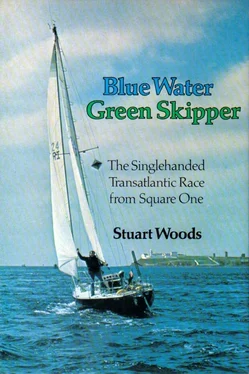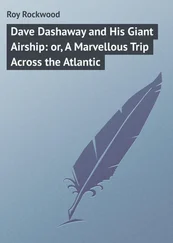The company was good. Dave was a large man with a meaty nose who has been known to sign autographs for Tommy Cooper, and when he is not sailing he runs the Tynagh Mines in County Galway. Philip, his other crew, is smaller than Dave and his nose is less meaty, but he is working on that. They are both very Irish, which is to say they never drink between eight and ten a.m. and never stop talking. There was a constant stream of banter in the manner of Robert Newton playing Long John Silver. Great care was taken to impress upon me at all times the infinite knowledge, skill, and courage required to sail a cruising yacht, as opposed to a dinghy. I kept expressing my surprise at how much easier everything was on a larger boat.
It went on like that all day, until Dave announced that he had made a command decision not to continue to the Arans, our late departure having made it impossible to reach Kilronan before the pubs closed. Instead, we would divert to Carrigaholt, in the Shannon estuary, where the state of the tide and the closing hours were more in harmony. We did so, and sailing into the estuary Dave showed me how to use a hand bearing compass to plot a position on a chart, my introduction to the art of coastal navigation. We berthed the boat at the village pier, then moved on to the pub to wait for Dave’s attractive and patient wife to collect us for the drive back to Galway. When we returned to the boat to pick up our gear I discovered another facet of cruising the west coast of Ireland: the rise and fall of the tides. In practice this means that you can tie up nicely level with a pier, trot up to the pub for a few pints, and return to find the boat fifteen feet down from its previous level. Negotiating this distance with a full load of Guinness can be tricky. The following week in Dublin I purchased a new item for the inventory of Pegeen : a rope ladder. How Dave and Philip had survived for so many seasons without one was beyond me.
The following weekend we journeyed back to Carrigaholt and sailed on to the Arans under spinnaker, with a stiff following breeze which blew us right on to the pubs — all of the pubs — on landing. I forget how many we visited, but the largest had two bars, and the smallest was the tiny sitting room of an Aran cottage. We lazed about Sunday morning and then sailed into Galway as the sun set. Everything all those songs say about the sun setting on Galway Bay is true. The place seems to be arranged to show the sun at its best — long summer twilights, just enough cloud to catch and color the light and the shining waters of the bay itself. It is best seen from a boat, and it is breathtaking.
All this yachting had quite turned my head. Thoughts of Fireballs vanished. Visions of cruisers now appeared. I just might be able to scrape together enough from my two-day-a-week income to buy something small.
In the meantime there was more sailing with Dave. Next was a new event, the Round Aran Race, to start from Galway on a Friday evening and be sailed around all three of the Aran Islands and into Kilronan, a distance of about sixty miles, with a nice night passage thrown in.
After that came the Galway Bay Sailing Club Regatta. Dave felt that an event of this stature required a pre-race conference on tactics, and this was duly held at Moran’s (also known as the Weir), a lovely little thatched pub on the Kilcolgan River, which empties into Galway Bay. We sailed Pegeen up the river, dried her out alongside the pier in front of the pub, and all concerned, plus a few others, gathered there. I will not place too much emphasis on the condition of the crew the following morning; suffice it to say that we ran aground three times on a falling tide en route to the starting line in Rinville Bay. At one point, half the crew were over the side in water up to their thighs, pushing Pegeen. Recovery was rapid enough for us to win the coveted Sonia Cup that afternoon, and we repaired once again to Moran’s for a suitable celebration.
There remained but one weekend before the end of the season, that is to say, before Pegeen ’s insurance coverage expired, and it was a memorable one. Racing was finished and, Philip having allowed his work to interfere with his sailing, Dave and I took a short cruise.
We sailed down the river and into the bay in about a Force four breeze, with the full mainsail and the big genoa set. As we entered open water we looked across to the north of the bay and saw a line of heavy-looking squalls racing toward us. “Shall we shorten sail, Skipper?” I asked.
“Ah, no,” replied Dave, laconically, at his most Irish. “She’ll be all right.”
The wind freshened quickly and the first puff of the squall, a big one, struck. There was a loud crack like a rifle shot; Dave was at the helm and I was sitting near the coach roof bulkhead to keep out of the wind. I instinctively ducked under the main hatch just in time to see the mast go, like a felled tree, into the water. The wind was up to about Force seven now, and Pegeen wallowed in the troughs as we struggled to get the mast and rigging back aboard. Dave quickly warned me not to start the engine until we were sure the rigging was clear of the propeller. While Dave lashed the badly bent mast and the boom to the deck I got the sails below and bagged them. Pegeen was rolling a lot, with no way on, and by the time I got back into the cockpit I was turning a bit green. The engine, bless its heart, chose to start first go, and we motored back toward Galway, the squalls gone and the sun shining again, I trying not to let on that I was queasy. Before I could object Dave had thrust a glass of dry sherry into my hand and was fixing himself a much-deserved gin and tonic. I hadn’t wanted the drink, but to my astonishment, at the first sip, my queasiness instantly vanished. A couple of other people have told me that dry sherry works for them, too, and it’s a lot more fun than pills.
With Pegeen having been safely berthed in the trawler layby, Dave treated me to an end-of-season dinner at the Great Southern Hotel, in the heart of Beautiful Downtown Galway. It had been quite a season for me; I had had the best of both worlds. I had raced the Mirror for a full season and still managed to get quite a lot of time in on Pegeen at the tail end. Meanwhile, three weeks before, another event had taken place that was to contribute to a radical redirection of my life. My grandfather, who was a major figure in my life and whom I loved very much, died. It was not a tragic death, for he was eighty-five and quite prepared to die. Well into his late seventies he was doing an hour’s calisthenics and running two miles every morning — he had been mowing his lawn when he was struck with his final illness and died only two weeks later. Still, I was sad; my memories of him were sharp and sweet from my earliest childhood, and I miss him even as I write this.
But he was as kind and generous to me in death as he had been in life, and with a riveting suddenness, I realized that I could now afford to buy a small yacht. Then, on the Sunday morning following this realization, I went into the village for the papers and read in The Observer that entries were beginning to come in for the 1976 Royal Western/ Observer Single-handed Transatlantic Race.
If I had been a comic-strip character, a lightbulb would suddenly have appeared above my head.
On the face of it, this was a ridiculous idea. In fact, it was entirely possible that it was a ridiculous idea right down to its very toes. My total sailing experience (not counting the week in Maine eight years before, when I was a passenger) consisted of not quite two seasons in a ten-foot ten-inch plywood dinghy and something less than half a season as third hand on a twenty-four-foot bilge keeler. Pegeen was the largest boat I had ever set foot on. My total navigation experience consisted of using a hand bearing compass maybe three times. I was thirty-six years old and, apart from a little tennis in London and sailing the Mirror, had not had any real exercise in fifteen years. It seemed a meager chronicle of assets.
Читать дальше












